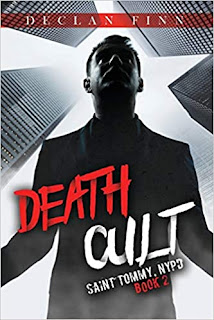When I first read this book over the summer, my first impression was that the story is worth the price of admission just for the first chapter. Having skimmed it to refresh my memory in preparation for writing the review, I stand by that statement.
To quote one of my favorite Youtubers, "Allow me to explain."
At first glance, all we have is probably the most common opener in the thriller/urban fantasy genre, namely, an action scene. And it is a good one in it's own right, which is something Finn's readers have come to take for granted. However, two qualities combine to make it stand out.
First, we immediately connect with and care about the characters involved. Surprisingly many authors forget that no matter how spectacular the action, we still need to be told why we should care. Books are not movies, and descriptions of gunshots/explosions/hand-to-hand combat don't have the same immediate appeal when read as when experienced on the giant screen in surround sound. Here we have Tommy Nolan and his family, whom we'd already come to know and love from Hell Spawn, so of course we care about them being under attack. But even going into this second book in the series cold, there is immediate, visceral desire to see the family come out intact from a violent confrontation.
That brings me to the second part. I love thrillers, but too many of them suffer from the same flaw as horror movies: the characters existing in a state artificial ignorance, having never cracked opened a book or watched a movie. There are certain things that happen in those genres, and they nearly always catch the main characters by surprise.
Not so with Detective Nolan and his family. They might live in the world of urban fantasy,but they're very much grounded in reality, knowing what is likely to happen and prepared for even the most unpleasant of possibilities. Thus, the first chapter does not go the way we might expect, setting the tone perfectly for the rest of the story.
What follows is a combination of ever-escalating challenges, which Tommy and his small group of friends and colleagues meet by not simply out-fighting, but out-thinking the enemy (including figuring out who and what the enemy is). The action scenes are evenly spaced out in between the actual detective work, so the pacing never slows down enough for us to lose interest. The climax is... fiery, both literally and figuratively, and while the story does come to a satisfying resolution, the jaw-dropping last paragraph makes you run, not walk, to start on the next installment.
Tommy Nolan as a character is a joy to follow around. He is a genuinely good man with no dark past or extra emotional baggage (aside from whatever naturally comes from years of police work in a large city coupled with his recent encounters with supernatural evil). He is a family man, and a man of faith, with both of those qualities being an organic part of the character rather than something slapped on as an afterthought. It's a refreshing change, considering that the urban fantasy genre almost requires the heroes to be flawed, dark and brooding. I like those too, when they're done well and don't go overboard on darkness, but it's good, and for lack of a better word, restful to spend time with Tommy Nolan and his crew. I would recommend it both to the traditional urban fantasy fans and to those who want to an easy, fast paced read as their first introduction to the genre.



